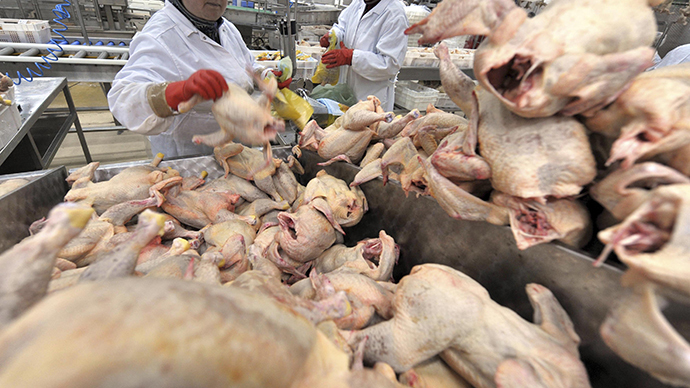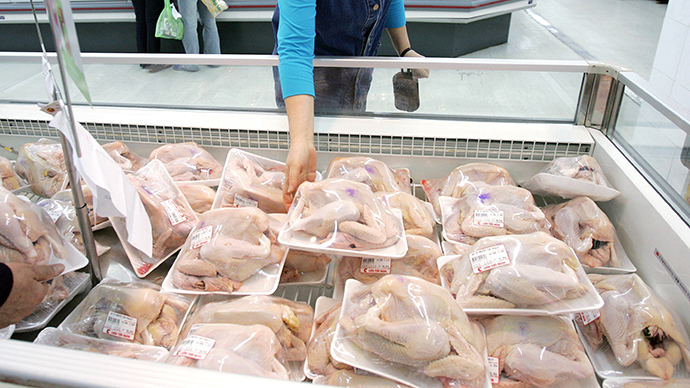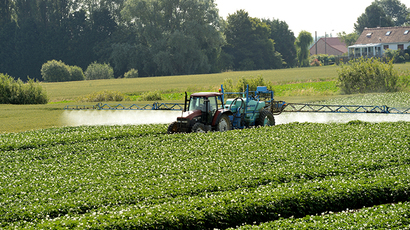Two-thirds of fresh retail chicken in UK could be contaminated with potentially lethal bacteria

A Guardian investigation has revealed alleged widespread hygiene failings in Britain's poultry industry, prompting three major UK supermarkets to launch emergency inquiries into their chicken suppliers.
Undercover film footage, photographic evidence, and allegations from whistleblowers indicate the UK's strict hygiene standards to avoid the contamination of chicken by a potentially lethal “campylobacter” bug can be easily flouted on British factory floors and farms.
In the last month, an array of hygiene breaches were uncovered that could contribute to the spread of this dangerous bug – including a factory floor littered with chicken guts and instances of chicken carcasses being ferried to factory production lines by workers' footwear. Other worrying practices concerning the processing of retail chicken and increased risks of contamination were also revealed by the investigation.
The damning allegations prompted Sainsbury’s, Marks & Spencer and Tesco to establish high priority investigations into their chicken suppliers over the past week.
Concern is focused on campylobacter, which is thought to be present in almost 65 percent of fresh British chicken sold in the UK. While the bug is allegedly terminated by thorough cooking, it harbors serious implications for human health.
Roughly 280,000 British citizens fall ill as a result of campylobacter each year. The bug also causes around 100 deaths in the UK annually. In an era of mass poultry production, contamination rates have increased in the last 10 years.
In light of the Guardian investigation’s findings and the subsequent decision of supermarket chains to conduct inquiries into their chicken suppliers, Britain’s Food Standards Agency (FSA) vowed on Wednesday to name supermarkets and chicken processors who demonstrate high rates of the potentially lethal bacteria.

Following the FSA’s announcement, government officials warned the body that such data could provoke a widespread food scare reminiscent of that sparked by former Conservative Edwina Currie in 1988. Currie had publicly expressed concern that most of Britain’s eggs were contaminated by salmonella.
The Guardian’s covert five-month investigation uncovered a chicken industry plagued by alleged sub-standard hygiene practices. These claims were directed at two of the UK’s most prolific poultry processors – 2 Sisters Food Group and Faccenda.
2 Sisters Food Group, a factory owned by a pair of sisters, produces both fresh poultry and chicken for a selection of ready meals to Tesco, Asda, Sainsbury’s, Aldi, M&S, and KFC. Faccenda owns several farms and an abattoir that supplies chicken to Nando’s and Asda.
Catherine Brown, chief executive of the FSA, had publicly promised in March 2014 to pursue an inquiry into campylobacter rates with “steely determination,” despite private sector resistance. And in a climate of increasing campylobacter contamination, the FSA recently ordered a new swathe of tests for the bug. Results were expected in June, and were due to be publicly released in the near future.
But on Wednesday, Brown requested the FSA reverse its previous decision to publish the data documenting campylobacter contamination levels for named processors and supermarkets each quarter.
Brown insists the FSA’s threat of exposing this bacterial contamination forced supermarkets and chicken processors to take seriously the body’s concerns about the bug’s widespread presence in Britain’s retail chicken sector. However, the industry has yet to make changes in production that are necessary to reduce such high levels of contamination.
.@foodgov need to put consumers first and publish the #campylobacter survey results in full on a quarterly basis http://t.co/7upGqqqg2E
— Which? News (@WhichNews) July 23, 2014
Erik Millstone, a food safety expert and professor at Sussex University, condemned the FSA’s decision to relinquish its promise to publish the data.
“In the last few years the Food Standards Agency has been under a great deal of pressure from the government and the food industry to ensure that it only provides reassuring messages, and especially that it should say nothing that could provoke any ‘food scares,’” Millstone observed.
“But the FSA was created to protect consumers, not to protect the food industry, or to give ministers a quiet time. This decision shows that its independence is entirely illusory,” he warned.













